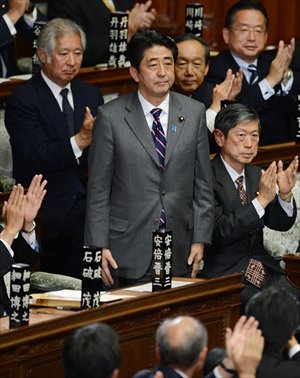Abe unveils new cabinet

Shinzo Abe formally became Japan's prime minister once again on Wednesday. But analysts said it was still uncertain whether his carefully chosen cabinet lineup would enable Abe to avoid the merry-go-round change of leaders in Japan that has produced seven prime ministers in less than seven years.
"I want to learn from the experience of my previous administration, including the setbacks, and aim for a stable government," Abe told reporters before the lower house of parliament voted him in as Japan's 96th prime minister.
Abe, 58, who previously served as prime minister from 2006 to 2007, has promised aggressive monetary stimulus by the Bank of Japan and big fiscal spending by the debt-laden government to fight against the deflation in which Japan's economy has been stuck for two decades.
Taro Aso, also a former prime minister, was named by Abe as his deputy and finance minister. Ex-trade and industry minister Akira Amari will be the state minister in charge of economic revitalization.
"Both Aso and Amari have abundant experience in tackling economic affairs," said Zhou Yongsheng, a professor of Japanese studies at China Foreign Affairs University. "The two appointments will provide a strong basis to realize the GDP growth target of 3 percent set by Abe."
Itsunori Onodera, 52, who was senior vice foreign minister in Abe's first cabinet, became defense minister, while Fumio Kishida, 55, a former state minister for issues related to Okinawa island, was appointed to the top diplomatic post.
Both positions are seen as key in reshaping the Abe administration's foreign relations with the US, China, South Korea and Russia.
"The hawkish Onodera holds a hostile stance against China in the Diaoyu Islands disputes," Zhou told the Global Times.
Amid the tensions in 2010 when a Chinese fishing boat captain was detained by Japan after a boat collision near the waters off the Diaoyu Islands, it was Onodera who realized that Google services in Japan used the Chinese name to refer to the uninhabited islands in the East China Sea and stormed to the Google office in Japan and requested a correction of the name to the Japanese-preferred term Senkaku.
The appointment of Kishida, Zhou said, reflects Abe's desire to focus on strengthening Japan's ties with the US.
China said Wednesday that it is paying close attention to the direction of Japan's foreign policy.
"We hope Japan can keep on the track of peaceful development and play a constructive role in maintaining peace and stability in Northeast Asia," China's foreign ministry spokeswoman Hua Chunying told a regular press briefing.
Abe's agenda also includes revising Japan's pacifist constitution and rewriting Japan's wartime history with a less apologetic tone.
The appointment of Akihiro Ota, a former leader of LDP's small ally New Komeito Party, as the Minister of Land, Infrastructure, Transport and Tourism, is seen as a prudent choice in dealing with potential maritime collisions with China's vessels near the Diaoyu Islands.
The New Komeito Party has supported a friendly Japan-China relationship. As there are growing fears about potential frictions between China and Japan's forces after China intensified regular patrols off the waters near the Diaoyu Islands, Ota is thought to be a calm hand.
Another important factor to decide Abe's political fate will be the struggle among factions inside the LDP, cautioned Lü Yaodong, a researcher of Japanese politics at the Chinese Academy of Social Sciences.
If Abe is unable to fulfill his promises made during the election campaign very soon, he will risk dissatisfaction from other LDP factions as happened to the Democratic Party of Japan during the last three years of their rule, Lü said.
Agencies contributed to this story